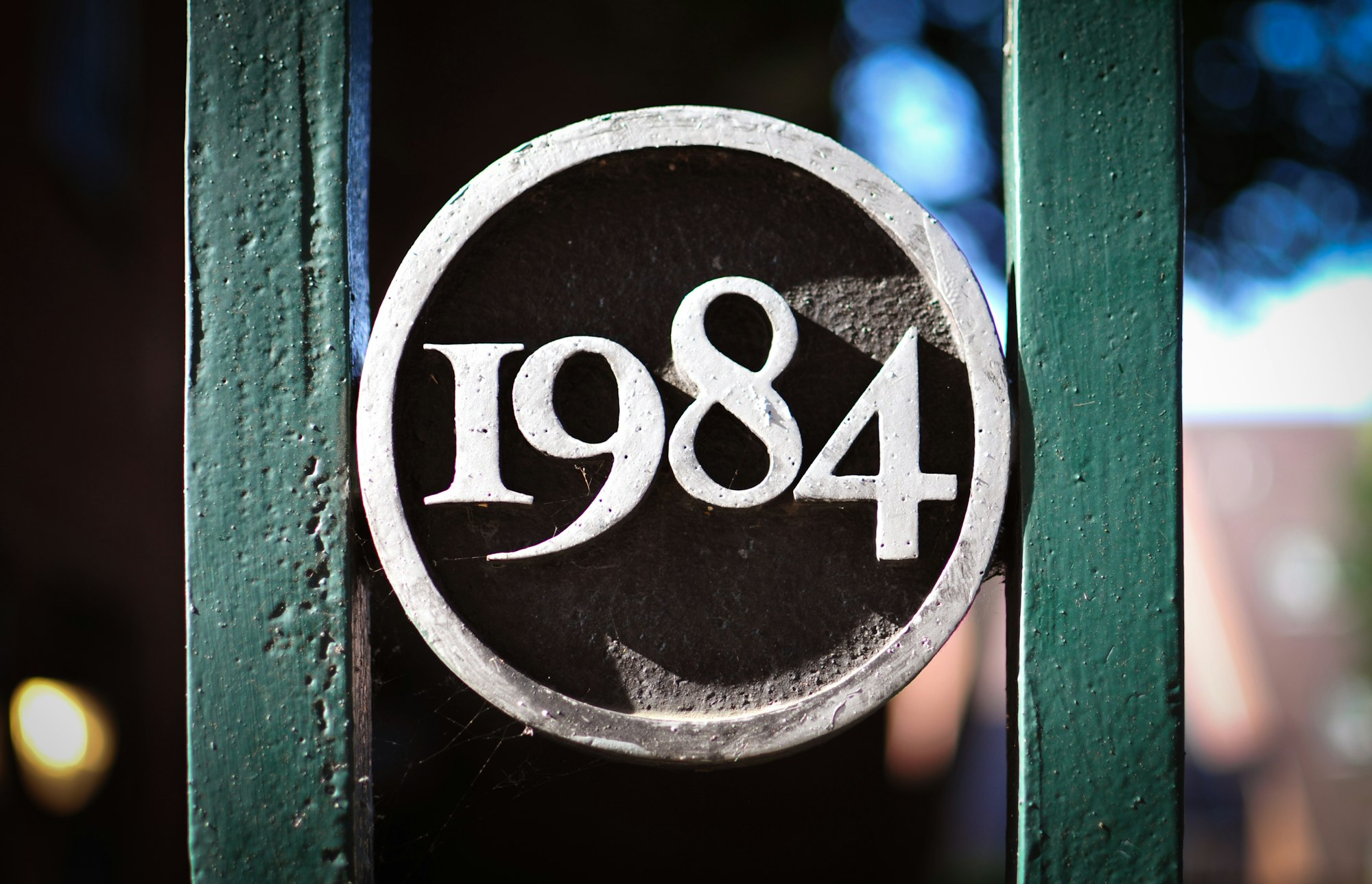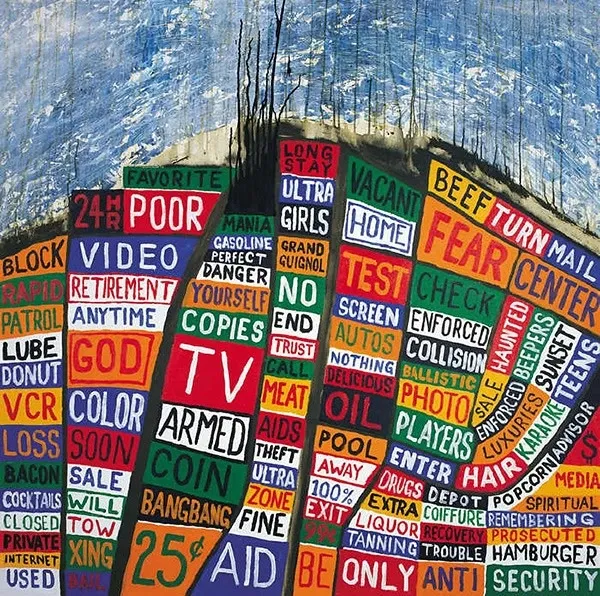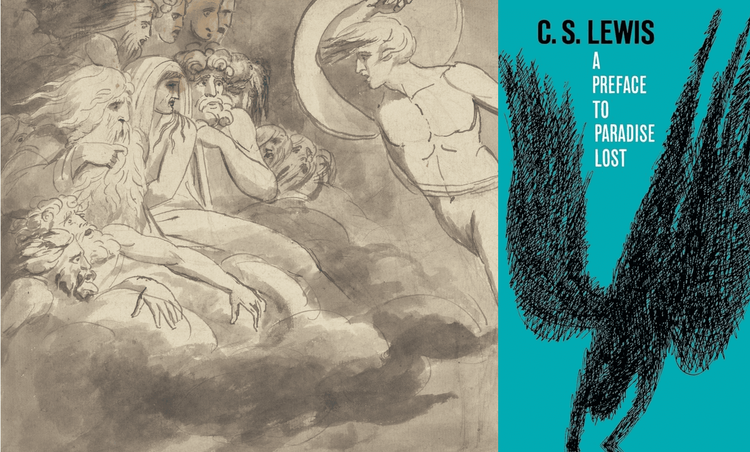The Passion of George Orwell

“It’s the Devil’s way now,” sings Radiohead’s Thom Yorke in their song 2+2=5, “there is no way out.” The impossible equation that is the song’s title is of course a reference to George Orwell’s novel Nineteen Eighty-Four, where the bewildering reality of 2+2=5 represents the final victory of the Party over truth and logic. If the Party can control even mathematical truth, what hope does one have to resist it? Is hope possible in light of the omnipresent gaze of Big Brother, under whose watchful eye the Thought Police prowl and political dissidents are made “unpersons”? Is there really “no way out”?
The search for hope amidst hopelessness, “hope against hope” in the face of the diabolical juggernaut of the Party, is one of the major themes of Orwell’s deservedly famous dystopia. However, that this very same hopelessness, and the despairing conclusion of the novel, can be read as a consequence of Orwell’s reluctance to admit of the supernatural or divine into the novel’s world. Further, the absence of a supernatural metaphysics from Nineteen Eighty-Four is not incidental, but was, at least in part, an attempt to contradict the vision of reality presented by his contemporary C.S. Lewis, in the latter’s novel That Hideous Strength.
Christian imagery might not be something you would immediately associate with Nineteen Eighty-Four. The surface-level of the novel depicts an austere and colorless world, in which all citizens are crushed underneath the authoritarian boot (“stamping on a human face—forever”) and nary a religious service, practice, or behavior can be found. Winston Smith, the protagonist, labors underneath the seemingly omniscient gaze of Big Brother and the Party, distantly wondering if there is any way to escape from the hellish world in which he finds himself. His world is without God, without religion, without the afterlife, without the soul—there is no existing authority above the Party. And yet, he searches for, and finds, ways to resist. As rays of light break through the dismal surroundings, he even allows himself the faint hope that maybe in the future the world will be different. Perhaps the oppressed underclass will one day revolt against the world order. As he says, “If there is hope, it lies in the Proles.” He does not expect to live to see it, but like a flower growing up through concrete, there is hope for life, for the future, for something different.
So, while religious imagery may not be superficially explicit, it nevertheless courses like a stream below the novel’s surface. In his path towards resistance, Smith finds himself inclining (rather unconsciously) towards a Christian view of reality. He adumbrates the doctrine of the Fall of Man, thinking to himself, “Why should one feel [the state of the world] to be intolerable unless one had some kind of ancestral memory that things had once been different?” He wants to join the Brotherhood, the mysterious underground organization led by Emmanuel Goldstein. Goldstein himself is described in Christ-like terms, having a “lean, Jewish face” that resembles “a sheep,” and he possesses a voice that also retains a “sheep-like quality.” One could be excused for connecting such an ovine character to the Lamb of God, who takes away the sin of the world. There are even rumors of a book that circulates clandestinely, without the Party’s approval—a compendium of all of Goldstein’s heresies and subversions. It is known simply as the book, and it is said to be indestructible: the eternal word that could be spoken again from memory, resurrected, should its physical existence be destroyed.

Winston meets a kindred spirit in the form of Julia, a fellow Inner Party member who uses her sexuality as a subversive way to thwart the Party’s designs. The story progresses until the duo meet the ever-watchful O’Brien, and with him they participate in what could only be described as a mass. Upon meeting O’Brien and joining the Brotherhood, Winston learns all he can about the organization and pledges himself to it. He confesses his sins (“We disbelieve in the principles of Ingsoc. We are thought-criminals. We are adulterers”) and O’Brien gives him wine. As they leave, a wafer-like tablet is placed on their tongues. “It is important,” O’Brien says, “not to go out smelling of wine.”
All of this happens, of course, before the narrative takes a sharp nosedive and Winston is abducted by the thought police. Even so, as he waits in the cell with other arrested thought criminals, he still dares to believe that there is authority above the Party, that “sanity is not statistical.” The Party cannot have the last word; they cannot control all of reality. O’Brien seeks to convince him otherwise. He educates Winston on the goals of the Party, and informs him that power is its own reward, the means to its own end, the sole reason for the Party’s existence. “God is Power,” declares O’Brien, and the Party is comprised of “the priests of power.” Just as Yorke sings, “Don’t question my authority or put me in the dock.” There is nothing above the Party—its power is total, its authority complete.
Winston is tortured and his appearance marred beyond recognition. O’Brien is very forward with his designs for the wayward protagonist, taking on a perversely sympathetic tone, aping a generous doctor who is here to save his unwell patient. “I am taking the trouble with you,” he says, “because you are worth the trouble…. You are mentally deranged…. Fortunately, it is curable.” He informs Winston that the cure is nothing less than total commitment to the Party, and this conversion flows necessarily from the abuse that is visited upon him. Every building block of Winston’s resistance will be annihilated and replaced, and he will be rebuilt and reprogrammed to love Big Brother unconditionally. As Winston lays upon the rack and is tortured for all of his sins—those of his own will and those not of his own—he clings to a desperate hope that there is some kind of power greater than the Party’s: be it human nature, the spirit of man, or his love for Julia. Surely something can defeat the Party, but what? “It’s the Devil’s way now.” Is there any way out?

There is some evidence that this Orwellian passion narrative was inspired, at least in part, by C.S. Lewis, and there are remarkable similarities between Nineteen Eighty-Four and Lewis’s own dystopian novel That Hideous Strength. The third book in his science fiction “Space Trilogy,” That Hideous Strength radically departs in style and tone the previous two novels in the series (Out of the Silent Planet and Perelandra), and revolves around a young married couple, Mark and Jane Studdock, as they witness the political machinations of a disturbing new organization—one with the delightfully Orwellian name of the N.I.C.E., National Institute for Co-ordinated Experiments. Even though it was written five years before Orwell’s masterpiece, That Hideous Strength seems almost at times to be a story about the world of Nineteen Eighty-Four fifty years before Winston Smith set pen to paper, detailing the rise and victory of the new world order and the triumph of the Party.
The parallels are striking. The leaders of the N.I.C.E. had learned to “despair of objective truth,” and, as a result, began to crave nothing but a “concentration upon mere power.” Like the Party, the N.I.C.E. is obsessed with power for its own sake, and with control over everything: “Nature,” writes Lewis, “would become their slave; and of that dominion no end.” For them, as for O’Brien, “God is Power.” Beyond power for its own sake, the Voldemortian desire to defeat death at all costs is a core principle of the N.I.C.E., as the “mad parson” Straik and the mad scientist Filostrato trumpet their victory over entropy, saying, “We have found a way to make a dead man live.” Straik reiterates the lust for power over death and nature, flaunting their break with Christianity, “You thought because fables had clustered about the phrase, ‘Son of Man,’ that Man would never really have a son who will wield all power. But he will.” With death comes its natural corollary, sexuality, and both the Party and the N.I.C.E. share a deep and abiding fear of it. The Party bans it; O’Brien tells Winston, “The sex instinct will be eradicated. Procreation will be an annual formality like the renewal of a ration card.” Reproduction is considered a “duty” to the Party. Marriages are arranged. Love is abolished—the only love permitted is that for Big Brother. The N.I.C.E.’s equal hostility is summed up by Filostrato, who wants to separate the “fun” from the “fertility, because “there will never be peace and order and discipline so long as there is sex.” Further similarities abound: the N.I.C.E. and the Party share a revulsion for the lower classes—the “proles” in Nineteen Eighty-Four and the working class in That Hideous Strength; the method of punishment by both organizations revolves around “remedial treatment” and “correction;” and the jobs performed by Mark Studdock and Winston Smith are nearly the same.
Mark is an eager and sycophantic sociologist who desperately wants to gain admission into the “Inner Circle” of whatever organization he finds himself in. Working for the N.I.C.E. appeals to him beyond anything he could ever have hoped for. He is assigned to a department that engages in propaganda, just as Winston does at the Ministry of Truth, and is tasked with “rehabilitating” a disgraced scientist, whose eventual restoration as a brilliant mind is politically useful for the N.I.C.E. He is to write two articles, under pseudonyms, to begin this rehabilitation. Mark is confused at first, and asks, “Is it Left or Right papers that are going to print all this rot?” To which he is informed, “Both, honey, both…Don’t you understand anything? Isn’t it absolutely essential to keep a fierce Left and a fierce Right?...That’s how we get things done.” The N.I.C.E. plays any political factions against each other to further its agenda, swaying the masses in whatever direction it needs through its manipulation of the news. “Of course we’re non-political,” Mark is told, “the real power always is.” Winston, for his part, rehabilitates and smears real and imagined persons every day, constantly changing and updating the entire corpus of news in order to make the Party appear to be omniscient and omnipotent. The famous line, “He who controls the present controls the past, he who controls the past controls the future,” is relevant to both novels.
Eventually, like Winston, Mark is seized by the authorities and imprisoned. He starts to doubt his commitment to the N.I.C.E. and is horrified to learn that their real motive with him is to apprehend his wife. Just as the Party wants Winston to betray Julia, the N.I.C.E. desires Mark to betray Jane. They order Mark to turn her over, and when faced with his rather witless intransigence, they decide that reeducation is the proper course. As with O’Brien and the Ministry of Love, the only accepted conversion for the N.I.C.E. is a total one, with uncompromising commitment; the best way to sway Mark would be by “conditioning him to identify himself so completely with the Cause that he will understand the real motive for securing her person and act on it.” He, like Winston, must be brought into the fold as a committed and unflagging zealot.
As Mark waits in his cell, he ponders his misfortune; he, like Winston, wonders if there is any power greater than the N.I.C.E. He laments his poor luck, wondering why, when he finally tried to change his course and do good, and defend his wife from the N.I.C.E., that he was abandoned by goodness. “You might have expected,” writes Lewis, “that when a man behaved in that way the universe would back him up.” Instead, “the very first moment you tried to be good, the universe let you down. It revealed gaps you had never dreamed of. It invented new laws for the express purpose of letting you down. That was what you got for your pains.” Mark and Winston find themselves in nearly the same situation: imprisoned by their adversaries, ordered to betray their loved ones, and abandoned by everything they believe is good. “It’s the Devil’s way now.” Is there any way out?

Up to this point, there has been a surprising amount of concord between the two novels, and the plot arcs are remarkably similar. Now that we’ve reached the climax, Orwell’s own comments on That Hideous Strength are important to consider. Writing a review for the Manchester Evening News, Orwell gave markedly (though somewhat reservedly) high praise for Lewis’s novel, before criticizing the aspects he found implausible. Orwell’s synopsis of the novel reads as though he was outlining his future work, observing that the N.I.C.E. plans for:
all superfluous life… to be wiped out, all natural forces tamed, the common people…to be used as slaves and vivisection subjects by the ruling caste of scientists, who even see their way to conferring immortal life upon themselves. Man, in short, is to storm the heavens and overthrow the gods, or even to become a god himself.
O’Brien could not have said it better. Orwell also praises Lewis’s depiction of the N.I.C.E., saying its “world-wide ramifications, its private army, its secret torture chambers, and its inner ring of adepts ruled over by a mysterious personage known as The Head is as exciting as any detective novel.”
But what happens after the prison scene is what upsets Orwell. After Mark is abandoned and is on the verge of losing all hope, the improbable happens, and Orwell was repulsed by the turn of events. Jane Studdock and her band of freedom fighters led by the incomparable Elwin Ransom (hero of the first two books in the trilogy) manage to free the ancient wizard Merlin from his trance beneath the town of Edgestow, and together they contact the supernatural forces beyond the earth that have been previously prevented from assisting them.
Havoc ensues, and a shockingly bloody denouement results in the utter annihilation of the N.I.C.E. as animals break free from their cages and rampage throughout the headquarters, indiscriminately killing as they escape. Earthquakes strike, reducing the town to rubble, and Merlin himself casts a Babel-like spell upon the leaders of the N.I.C.E., rendering their speech unintelligible and thereby making any attempted counter-attack or re-organization impossible. In short, divine intervention—with explicitly Christian overtones—saves the day.
Orwell complains that these rather incredible developments “weaken the story” and that Lewis’s novel would have been better had the supernatural not kept “breaking in.” “One could recommend this book unreservedly if Mr. Lewis had succeeded in keeping it all on a single level,” Orwell writes, and complains that “the book ends in a way that is so preposterous that it does not even succeed in being horrible in spite of much bloodshed.” But this is not what bothers him the most, for the fact that the divine intervention ruins the suspense was Lewis’s egregious sin. He believes that this development “in effect” decides the issue “in advance.” “When one is told that God and the Devil are in conflict one always knows which side is going to win,” writes Orwell, “the whole drama of the struggle against evil lies in the fact that one does not have supernatural aid.” Mark is rescued by God’s intervention. He is reunited with his wife and the forces of evil are crushed beyond any chance of recovery.
Where does that leave Winston, then? If the supernatural cannot rescue him from his place in that cell, then who will? Orwell himself seems to be searching for an answer: is it “the spirit of man”? Is it “the universe”? Is it “life”? But O’Brien is unimpressed; “We control nature,” he tells Winston, “we control life.” Then the crux of the conversation comes. Winston suggests that there is “something” out there that cannot be defeated, though he knows not what it is; “some spirit,” he ventures, “some principle.” Then, O’Brien asks the loaded but inevitable question: “Do you believe in God, Winston?” Here is an opportunity for the supernatural to break in. Is there any way out? Can Winston call upon the one source of transcendent authority that could supersede the outrageous claims of the Party? But any chance for a divine rescue, and eventual victory, is dashed as the simple and direct “No” passes from Winston’s lips, and hope dissipates completely.

The supernatural will not break in. “Then what will defeat us?” asks O’Brien. “I don’t know,” says Winston weakly, “the spirit of man.” O’Brien once again mocks him, shows him his shriveled and mutilated appearance, and says, “Do you see that thing facing you? That is the last man. If you are human, that is humanity.”
What options are left for Winston at this point? He still holds on to his love for Julia. All the while, as one grotesque horror after another is inflicted upon him in the Ministry of Love, Winston knows that the keystone which still supports his rebellion is his love for Julia. If he can keep himself from betraying her, he will have defeated the Party. O’Brien agrees, but he knows Winston can be made to betray her. He takes Winston to the infamous Room 101, where his worst fear will be made manifest in the form of ravenous rats eating him alive. As a mask is prepared to fit on his head—with the starving creatures thrashing about inside—he panics. Winston had previously believed that he could endure anything so as to not betray Julia; while he was imprisoned earlier, he thought, “If I could save Julia by doubling my own pain, would I do it? Yes, I would.” But when faced with the situation, he finds he cannot. He abandons his pretense and screams for an intervention—he needs someone, anyone; “he must interpose another human being, the body of another human being, between himself and the rats.” He knew that in the whole world “there was one person to whom he could transfer his punishment.” Who can he offer up? Who is the sacrificial lamb who can take this penalty away from him? “Do it to Julia! Do it to Julia! Not me! Julia!”
Winston loses. No supernatural force breaks in. He could not die for Julia, and he could not die as a martyr. He is crushed by O’Brien and reduced to a devoted and pliant Party member, the perfect servant who loves Big Brother. Mark was saved by God, but Winston was not. And the irony here is that while Orwell wrote that the drama was sucked out of That Hideous Strength because it gave the game away in advance, the situation in Nineteen Eighty-Four is simply the perfect reciprocal—without any divine intervention, the game is given away in advance. Lewis may not have been able to let his characters lose, but Orwell could not let them win.
While it is not from That Hideous Strength, Lewis nevertheless found himself echoing Winston’s thoughts about Julia when his wife—Joy Gresham—passed away from bone cancer. In his intensely personal reflection on her death, A Grief Observed, he wonders if he could have taken her suffering upon himself, as Winston thought he could bear Julia’s. “If only I could bear it…instead of her,” he writes, but then goes on to muse, “one can’t tell how serious that bid is, for nothing is staked on it.” Such a thing is probably not even possible—he’s only human, after all; how could he bear such suffering for the sake of someone else? Once again, his only hope could be for the supernatural to break in. Instead of relying on himself, or any other ordinary mortal, Lewis instead turns to Christ, and writes, “It was allowed to One, we are told, and I find I can now believe again, that He has done vicariously whatever can be so done.” The supernatural must break in. Without it, there is no hope: not for Winston Smith, not for Mark Studdock, not for C.S. Lewis.
In the world of Nineteen Eighty-Four, The Passion of George Orwell ultimately is unfulfilled. The game is given away in advance, and there is no avenue for victory, no hope to be found. “It’s the Devil’s way now,” sings Thom Yorke, “there is no way out. You can scream and you can shout. It is too late now.”



Member discussion